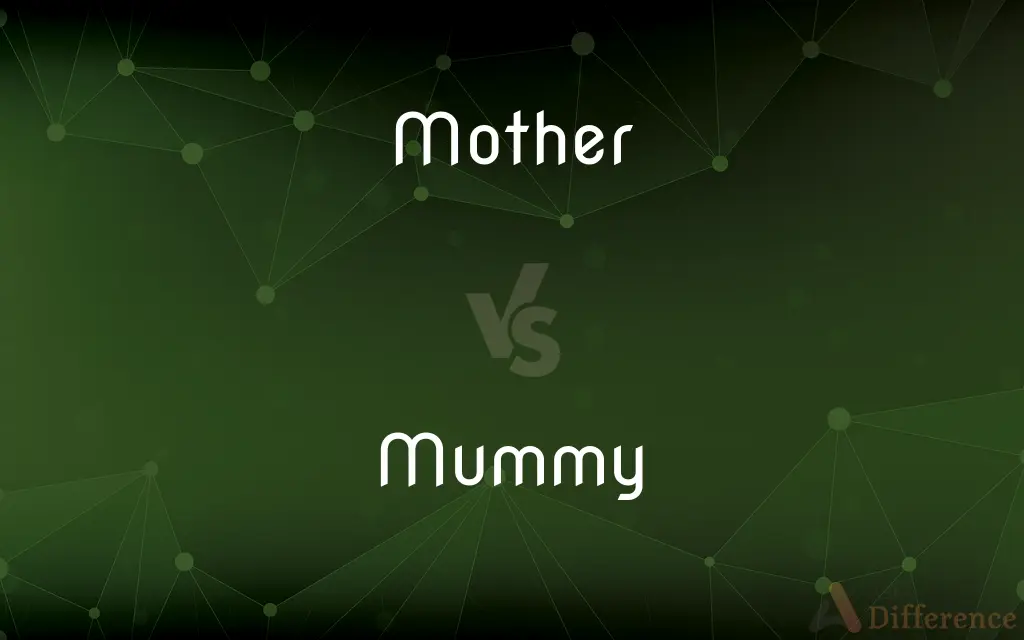Mother vs. Mummy — What's the Difference?
By Urooj Arif & Maham Liaqat — Updated on April 22, 2024
Mother refers to a female parent or guardian, emphasizing the biological or nurturing role, whereas mummy is a casual or affectionate term used primarily in British English.

Difference Between Mother and Mummy
Table of Contents
ADVERTISEMENT
Key Differences
Mother is a universally recognized term referring to a female parent, focusing on the biological and emotional connection to her children. On the other hand, mummy is often used in informal contexts, particularly in the UK, reflecting a more affectionate and casual tone.
The term mother is used globally and serves as a formal and respectful reference to a female who has given birth or adopted a child. Whereas mummy is considered more colloquial and is commonly heard in households or among family members in certain English-speaking countries.
Mother can be used in both personal and formal settings, maintaining its reverence and universal applicability. In contrast, mummy might be deemed too informal or out of place in official or serious discourse.
The use of mother in literature and media often carries a tone of dignity and respect. Conversely, mummy might appear in contexts emphasizing intimacy and a close-knit family environment.
In educational or psychological discussions, professionals prefer the term mother to discuss roles and impacts in child development. Mummy, however, is rarely used in such analyses, due to its informal nature.
ADVERTISEMENT
Comparison Chart
Usage
Global, formal
Informal, primarily UK
Context
Universal, all settings
Casual, familiar settings
Tone
Respectful, serious
Affectionate, endearing
Frequency in Literature
High
Low
Professional Use
Common
Uncommon
Compare with Definitions
Mother
A female authority figure.
She is the mother of our church group.
Mummy
An informal term for mother used mainly by children.
I gave mummy a hug.
Mother
A source or origin.
Necessity is the mother of invention.
Mummy
Sometimes used in media to depict a nurturing, homely image.
In the film, the child cries out for mummy.
Mother
A female parent of a child.
She became a mother last year.
Mummy
Used affectionately by adults reflecting on childhood.
Mummy always knew what to do.
Mother
A term of respect for an older woman.
We call her Mother Teresa.
Mummy
A term used in familiar speech within the family.
Mummy makes the best cookies.
Mother
A mother is the female parent of a child. Mothers are women who inhabit or perform the role of bearing some relation to their children, who may or may not be their biological offspring.
Mummy
A playful or endearing reference to a mother.
Look, mummy's home!
Mother
A woman who gives birth to a child.
Mummy
A mummy is a dead human or an animal whose soft tissues and organs have been preserved by either intentional or accidental exposure to chemicals, extreme cold, very low humidity, or lack of air, so that the recovered body does not decay further if kept in cool and dry conditions. Some authorities restrict the use of the term to bodies deliberately embalmed with chemicals, but the use of the word to cover accidentally desiccated bodies goes back to at least 1615 AD (see the section Etymology and meaning).
Mother
A woman whose egg unites with a sperm, producing an embryo.
Mummy
The dead body of a human or animal that has been embalmed and prepared for burial, as according to the practices of the ancient Egyptians.
Mother
A woman who adopts a child.
Mummy
A withered, shrunken, or well-preserved body that resembles an embalmed body.
Mother
A woman who raises a child.
Mummy
Mother.
Mother
A female parent of an animal.
Mummy
(countable) An embalmed human or animal corpse wrapped in linen bandages for burial, especially as practised by the ancient Egyptians and some Native American tribes.
Mother
A female ancestor.
Mummy
A reanimated embalmed human corpse, as a stock character in horror films.
Mother
A woman who holds a position of authority or responsibility similar to that of a mother
A den mother.
Mummy
Any naturally preserved human or animal body.
Mother
A mother superior.
Mummy
A brown pigment originally prepared from the ground-up remains of Egyptian animal or human mummies mixed with bitumen, etc.
Mummy brown
Mother
Used as a form of address for such a woman.
Mummy
A pulp.
Mother
A woman who creates, originates, or founds something
"the discovery of radium, which made Marie Curie mother to the Atomic Age" (Alden Whitman).
Mummy
A substance used in medicine, prepared from mummified flesh.
Mother
A creative source; an origin
Philosophy is the mother of the sciences.
Mummy
A sort of wax used in grafting.
Mother
Used as a title for a woman respected for her wisdom and age.
Mummy
Mother.
Mother
Maternal love and tenderness
Brought out the mother in her.
Mummy
To mummify.
Mother
The biggest or most significant example of its kind
The mother of all battles.
Mummy
A dead body embalmed and dried after the manner of the ancient Egyptians; also, a body preserved, by any means, in a dry state, from the process of putrefaction.
Mother
Vulgar Slang Something considered extraordinary, as in disagreeableness, size, or intensity.
Mummy
Dried flesh of a mummy.
Mother
A stringy slime composed of yeast cells and bacteria that forms on the surface of fermenting liquids and is added to wine or cider to start the production of vinegar.
Mummy
A gummy liquor that exudes from embalmed flesh when heated; - formerly supposed to have magical and medicinal properties.
Mother
Relating to or being a mother.
Mummy
A brown color obtained from bitumen. See Mummy brown (below).
Mother
Characteristic of a mother
Mother love.
Mummy
A sort of wax used in grafting, etc.
Mother
Being the source or origin
The mother church.
Mummy
One whose affections and energies are withered.
Mother
Derived from or as if from one's mother; native
One's mother language.
Mummy
To embalm; to mummify.
Mother
To give birth to
Mothered three children.
Mummy
Informal terms for a mother
Mother
To be the source of; create or produce
"Necessity mothered the invention of printing" (Irving Wallace).
Mummy
A body embalmed and dried and wrapped for burial (as in ancient Egypt)
Mother
To act as mother to, as in nourishing and protecting.
Mother
To act or serve as a mother.
Mother
A female parent, sometimes especially a human; a female who parents a child (which she has given birth to, adopted, or fostered).
I am visiting my mother today.
The lioness was a mother of four cubs.
Mother
A female who has given birth to a baby; this person in relation to her child or children.
My sister-in-law has just become a mother for the first time.
He had something of his mother in him.
Mother
A pregnant female, possibly as a shortened form of mother-to-be; a female who gestates a baby.
Nutrients and oxygen obtained by the mother are conveyed to the fetus.
Mother
A female who donates a fertilized egg or donates a body cell which has resulted in a clone.
Mother
(figuratively) A female ancestor.
Mother
(figuratively) A source or origin.
The Mediterranean was mother to many cultures and languages.
Mother
Something that is the greatest or most significant of its kind. mother of all.}}
Mother
A title of respect for one's mother-in-law.
Mother Smith, meet my cousin, Doug Jones.
Mother
(dated) A term of address for one's wife.
Mother
(figuratively) Any elderly woman, especially within a particular community.
Mother
(figuratively) Any person or entity which performs mothering.
Mother
Dregs, lees; a stringy, mucilaginous or film- or membrane-like substance consisting of acetobacters which develops in fermenting alcoholic liquids such as wine, or cider, and turns the alcohol into acetic acid with the help of oxygen from the air.
Pieces of mother, adding mother to vinegar
Mother
(railroading) A locomotive which provides electrical power for a slug.
Mother
The principal piece of an astrolabe, into which the others are fixed.
Mother
The female superior or head of a religious house; an abbess, etc.
Mother
(obsolete) Hysterical passion; hysteria; the uterus.
Mother
A disc produced from the electrotyped master, used in manufacturing phonograph records.
Mother
Motherfucker.
Mother
A striking example.
Mother
Alternative form of moth-er
Mother
To give birth to or produce (as its female parent) a child. father]].
Mother
(transitive) To treat as a mother would be expected to treat her child; to nurture.
Mother
(transitive) To cause to contain that substance which develops in fermenting alcohol and turns it into vinegar.
Mothered oil, mothered vinegar, mothered wine
Mother
To develop mother.
Mother
A female parent; especially, one of the human race; a woman who has borne a child.
Mother
That which has produced or nurtured anything; source of birth or origin; generatrix.
Alas! poor country! . . . it can notBe called our mother, but our grave.
I behold . . . the solitary majesty of Crete, mother of a religion, it is said, that lived two thousand years.
Mother
An old woman or matron.
Mother
The female superior or head of a religious house, as an abbess, etc.
Mother
Hysterical passion; hysteria.
Mother
A film or membrane which is developed on the surface of fermented alcoholic liquids, such as vinegar, wine, etc., and acts as a means of conveying the oxygen of the air to the alcohol and other combustible principles of the liquid, thus leading to their oxidation.
Mother
Same as motherfucker.
Mother
A person or thing with some exceptional quality, as great size or power; as, a grizzly stuck his nose in my tent and I grabbed my pistol and shot the mother.
Mother
Received by birth or from ancestors; native, natural; as, mother language; also acting the part, or having the place of a mother; producing others; originating.
It is the mother falsehood from which all idolatry is derived.
Mother
To adopt as a son or daughter; to perform the duties of a mother to.
The queen, to have put lady Elizabeth besides the crown, would have mothered another body's child.
Mother
To become like, or full of, mother, or thick matter, as vinegar.
Mother
A woman who has given birth to a child (also used as a term of address to your mother);
The mother of three children
Mother
A stringy slimy substance consisting of yeast cells and bacteria; forms during fermentation and is added to cider or wine to produce vinegar
Mother
A term of address for an elderly woman
Mother
A condition that is the inspiration for an activity or situation;
Necessity is the mother of invention
Mother
Care for like a mother;
She fusses over her husband
Common Curiosities
Can mother be used for someone who is not a biological parent?
Yes, mother can refer to any female figure who fulfills the role of a parent.
What emotional connotations does mummy carry?
Mummy often carries connotations of warmth, care, and intimacy.
Is mummy used outside of the UK?
Yes, mummy is also used in some Commonwealth countries, though less frequently than in the UK.
Can the term mother be used in a derogatory way?
While generally respectful, context can sometimes render it derogatory.
How does the use of mother impact the tone of a conversation?
Using mother typically adds a tone of respect and seriousness to the conversation.
What impact does calling someone mother have in social settings?
It can signify respect and establish a mature, caring relationship.
Why might someone prefer to use mother over mummy?
They might prefer mother for its formality and broader acceptance.
What is the origin of the term mother?
The term "mother" originates from Old English "mōdor", akin to Latin "mater".
Is it appropriate to use mummy in formal writing?
Mummy is generally considered too informal for official or formal writing.
Does the term mummy have any other meanings?
Yes, mummy can also refer to a preserved body, as in ancient Egyptian mummies.
Is it common to use mother in everyday conversation?
Yes, mother is commonly used both in everyday and formal contexts.
How do children typically learn to use the term mummy?
Children often adopt the term mummy from familial usage and cultural influence.
In what types of literature is mummy frequently found?
Mummy is often found in children’s literature or works focusing on family life.
How does the usage of mother vary globally?
While universally recognized, nuances in usage and connotation can vary by culture.
What are the psychological implications of using mummy vs. mother?
The choice between these terms can reflect and affect the perceived intimacy of the parental relationship.
Share Your Discovery

Previous Comparison
Localisation vs. Localization
Next Comparison
Donation vs. GiftAuthor Spotlight
Written by
Urooj ArifUrooj is a skilled content writer at Ask Difference, known for her exceptional ability to simplify complex topics into engaging and informative content. With a passion for research and a flair for clear, concise writing, she consistently delivers articles that resonate with our diverse audience.
Co-written by
Maham Liaqat













































